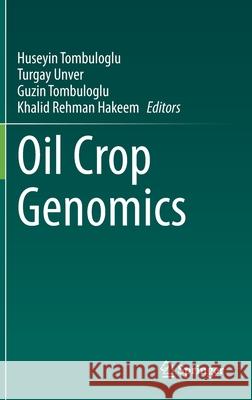Oil Crop Genomics » książka



Oil Crop Genomics
ISBN-13: 9783030704193 / Angielski / Twarda / 2021 / 462 str.
Oil Crop Genomics
ISBN-13: 9783030704193 / Angielski / Twarda / 2021 / 462 str.
(netto: 690,08 VAT: 5%)
Najniższa cena z 30 dni: 693,97
ok. 16-18 dni roboczych.
Darmowa dostawa!
Dr. Huseyin Tombuloglu (PhD) is Associate Professor at Institute of Research and Medical Counsultaion (IRMC) of Imam Abdulrahman bin Faisal University, Dammam, Saudi Arabia. He received his BSc. degree in 2007 from Istanbul University, Department of Molecular Biology and Genetics, Turkey, and also he studied as an exchange student in University of Groningen, the Netherlands. He obtained MS degree (Biology) in 2010 and PhD degree (Biotechnology) in 2014. He bacame Assistant Professor in 2014, and Associate Professor in 2018. He has more than 15 years of teaching and research experience in Genetics, Molecular Biology, Plant Genomics, and Biotechnology, as well as Bioinformatics. He is one of the member of the International Olive Genome Sequencing Consortium. Currently, he is one of the research team member of the International Garlic Genome Sequencing Consortium (IGGS). His current research is focused on genome sequencing of plants, data analysis, proteomics, and nanoparticle-plant interaction.
Prof. Turgay Unver (PhD) Turgay Unver achieved his PhD degree from the Middle East Technical University (METU; Turkey) in 2008. He became Assistant Professor at Cankiri Karatekin University in 2009, and obtained his Associated Professorship in 2011. His main research areas involve genome and transcriptome analyses, including microRNA. He has published >50 indexed articles with more than 4000 citations. In 2012, he was awarded the TWAS prize. He was selected as outstanding young scientist by the Turkish Academy of Science in 2013. He is currently running two Biotechnology companies and bearing editorial duties for Genomics (Elsevier), BMC Genomics, and Plos One.
Dr. Guzin Tombuloglu (PhD) received her MS degree (Biology) in 2008 and PhD degree (Biotechnology) in 2014. She has experience in transcriptome sequencing, plant abiotic stress tolerance, molecular biology of plants. During her PhD, she studied transcriptomics identification of boron tolerance mechanism in barley. She has experienced several projects on abiotic stress, plant stress responses, Boron toxicity and transcriptomics. She has given several courses on teaching Genetics, Molecular Biology, and Biotechnology education for more than 15 years. She also worked as a Chairman in Pathology Laboratory Techniques Programme and Assistant Manager at Vocational School of Medical Sciences at the university level.Dr. Khalid Rehman Hakeem (PhD) is Professor at King Abdulaziz University, Jeddah, Saudi Arabia. After completing his doctorate (Botany; specialization in Plant Eco-physiology and Molecular Biology) from Jamia Hamdard, New Delhi, India, in 2011, he worked as Assistant Professor at the University of Kashmir, Srinagar, for a short period. Later, he joined Universiti Putra Malaysia, Selangor, Malaysia, and worked there as Post Doctorate Fellow in 2012 and Fellow Researcher (Associate Prof.) from 2013 to 2016. Dr. Hakeem has more than 10 years of teaching and research experience in plant eco-physiology, biotechnology and molecular biology, medicinal plant research, plant-microbe-soil interactions as well as in environmental studies. He is the recipient of several fellowships at both national and international levels; also, he has served as the visiting scientist at Jinan University, Guangzhou, China. Currently, he is involved with a number of international research projects with different government organizations. So far, Dr. Hakeem has authored and edited more than 55 books with international publishers, including Springer Nature, Academic Press (Elsevier), and CRC Press. He also has to his credit more than 115 research publications in peer-reviewed international journals and 60 book chapters in edited volumes with international publishers. At present, Dr. Hakeem serves as an editorial board member and reviewer of several high-impact international scientific journals from Elsevier, Springer Nature, Taylor and Francis, Cambridge, and John Wiley Publishers. He is included in the advisory board of Cambridge Scholars Publishing, UK. He is also a fellow of Plantae group of the American Society of Plant Biologists, member of the World Academy of Sciences, member of the International Society for Development and Sustainability, Japan, and member of Asian Federation of Biotechnology, Korea. Dr. Hakeem has been listed in Marquis Who’s Who in the World, since 2014–2020. Currently, Dr. Hakeem is engaged in studying the plant processes at eco-physiological as well as molecular levels.
Plants are an important source of fats and oils, which are essential for the human diet. In recent years, genomics of oil biosynthesis in plants have attracted great interest, especially in high oil-bearing plants, such as sesame, olive, sunflower, and palm. Considering that, genome sequencing projects of these plants have been undertaken with the help of advanced genomics tools such as next generation sequencing. Several genome sequencing projects of oil crops are in progress and many others are en route. In addition to genome information, advanced genomics approaches are discussed such as transcriptomics, genomics-assisted breeding, genome-wide association study (GWAS), genotyping by sequencing (GBS), and CRISPR. These have all improved our understanding of the oil biosynthesis mechanism and breeding strategies for oil production.
1997-2026 DolnySlask.com Agencja Internetowa
KrainaKsiazek.PL - Księgarnia Internetowa









